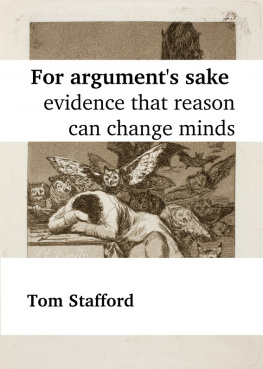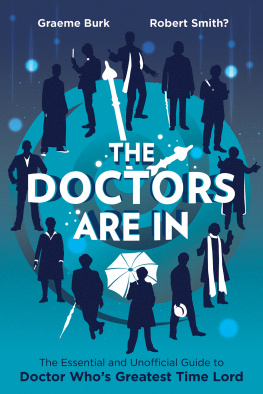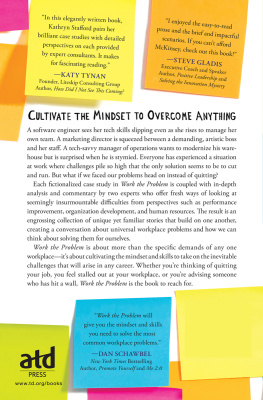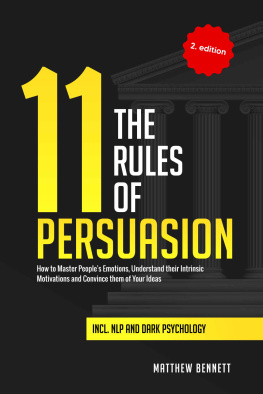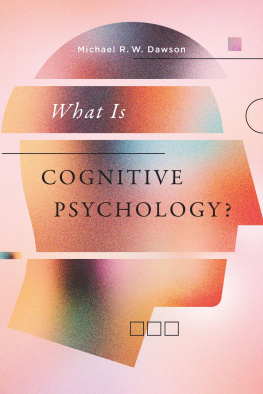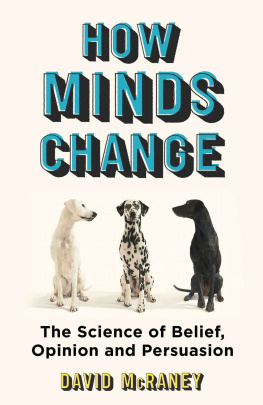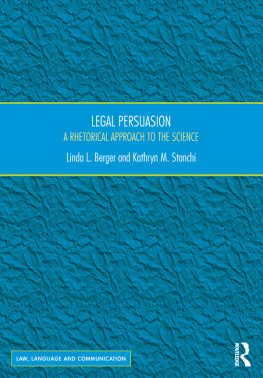For argument'ssake:
evidence thatreason can change minds
by TomStafford
@tomstafford on twitter
Illustrations byHarriet Cameron
Contents
Introduction
Now, two centuriesinto the age of reason, our collective endorsement of humanirrationality is at a high-water mark. By this I don't just meanthe fads, conspiracy theories and fundamentalisms that besetsociety, but also how we talk about the human ability to reason,how we collectively think of ourselves.
The attempt toscientifically study reasoning, my field of academic psychology,seems preoccupied with our limits and errors. One of the mostsuccessful research programmes in psychology has been the"heuristics and biases" approach, kickstarted by Amos Tversky andDaniel Kahneman in their landmark 1974 paper [1], and for whichDaniel Kahneman got the Nobel prize in 2002. One reading of thisliterature is as a collection of the flaws in our thinking - aroll-call of failure. And in parallel to the psychologists whoseresearch careers are dedicated to the systematic errors in ourthinking, so the media seems over-ready to pick up and publishthese errors. Something about headline writers draws them tostories depicting our choices as unreliable, or - worse - not evenour choices, that we are controlled by our brains or our genes orrandom aspects of the environment. The portrait drawn is one inwhich our values and choices as are as likely to be determined bywhether we happen to be holding a hot cup of coffee as by what wesincerely believe.
The central essayof this ebook was written as a response to this celebration ofirrationality. The question it asks is whether it is possible tolook hard at the evidence and come up with a differentinterpretation - that although the funeral lengthened, reason neverdied.
Part of theproblem is that irrationality seems ubiquitous if you definerationality in a narrow enough way. Kahneman's Nobel prize was ineconomics, and the "heuristics and biases" research programme wasalways about establishing violations of economic rationality. Thatmeans violating the principles of calculation and logic. This isthe rationality of the computer and the analytic philosopher. It isthe disinterested and perfect rationality that is impossible tomaintain if you need to make immediate choices with insufficientinformation. Human reason is defined as much by the need to act asby pure logic, and showing that we fall short of that high standardisn't cause to declare us hopelessly irrational. The evidence canbe viewed as showing our failures, if you start with a perfectstandard. Or it can be seen as as testament to our success, to therange and versatility of our of reasoning, if you start with theassumption that the ability for Thinking Meat to do anythingabstract is pretty impressive.
I have beenpondering our culture's enthusiasm for seeing people as irrational.Why do scientists frame their results in the way they do? And whydo media commentators seem so ready to pick up on science storiesframed that way, or even to frame science stories that waythemselves?
It is possiblethat stories of our irrationality are comforting in difficulttimes. If we aren't able to reason, then we don't have to, thethought would go. The responsibility for thinking and choosing islifted. That sounds like a comforting but dangerous lie to tellourselves. Now, as much as ever in history, we have a collectiveneed to take responsibility, to think carefully about our choicesas a society.
Reference:
[1] Tversky, A.,& Kahneman, D. (1974). Judgment under uncertainty: Heuristicsand biases. science, 185(4157), 1124-1131.

For argument's sake: evidence that reasonalone can change minds
Are we, the humanspecies, unreasonable? Do rational arguments have any power to swayus, or is it all intuition, hidden motivations, and various otherforms of prejudice?
The question hasbeen hanging over me because of my profession. I work as acognitive psychologist, researching and teaching how people think.My job is based on rational inquiry, yet the picture of humanrationality painted by our profession can seem pretty bleak. Everyweek I hear about a new piece of research which shows up some quirkof our minds, like the one about people given a heavy clip board judge public issues as more importantthan people given a light clip board . Or thatmore attractive people are judged as moretrustworthy, or they arguments they give as moreintelligent .
Commentators andpopularisers of this work have been quick to pick up on thesefindings. Dan Ariely has a book calling us Predictably Irrational ", and theintroduction tells us we are pawns in a game whose forces welargely fail to comprehend. We usually think of ourselves [with]ultimate control over the decisions we make [but] this perceptionhas more to do with our desiresthan reality. Cordelia Fines book A mind of itsown " has the subtitlehow your brain distorts and deceives, whilst David McRaneydoesnt pull any punches with the title of his You are not so smart ".
The wider contextis the recent progress in the sciences that puts our species in thebiological context of the animals, a project that mostpsychologists are signed up to to some degree. A reflection of thisare all the experiments which attempt to give a mechanistic accountof the mind, an account which downplays idiosyncrasy, subjectivityand nondeterminism, an account grounded in the same principleswhich govern the rest of the natural world. The philosopher JohnGray was reflecting on this trend in research, as well as givingvent to his own enthusiastic pessimism, when he wrote:
"We think ouractions express our decisions. But in nearly all of our life,willing decides nothing. We cannot wake up or fall asleep, rememberor forget our dreams, summon or banish our thoughts, by deciding todo so. When we greet someone on the street we just act, and thereis no actor standing behind what we do. Our acts are end points inlong sequences of unconscious responses. They arise from astructure of habits and skills that is almost infinitelycomplicated. Most of our life is enacted without consciousawareness."
The science, andthose who promote it, seem to be saying that were unreasonablecreatures. Either we don't act on rational principles, or when wedo we're mistaken and something else (our brains? evolution?) isreally in the driving seat. Thats a problem, given that many ofour social institutions (such as democracy) are based on anassumption that rational persuasion can occur. If I believed thestory told in these books I would be forced to choose between myprofession as a cognitive scientist and political commitment as acitizen and democrat.
Fortunately, as acognitive scientist, I dont have to believe what Im told abouthuman nature - I can look into it myself. So I set out to get tothe bottom of the evidence on how we respond to rational arguments.Does rationality lose out every time to irrational motivations? Oris there any hope to those of us who want to persuade because wehave good arguments, not because we are handsome, or popular, oroffer heavy clipboards.
Persuasion
One of themost famous examples of the way our minds twist arguments is an experiment performed byCharles Lord, Lee Ross and Mark Lepper way back in 1979. TheseAmerican social psychologists recruited participants who had viewsfor or against the death penalty. They then presented them withsummaries from reports of studies which seemed to support or opposethe death penalty. Heres a pro-death penalty example:
Kroner andPhillips (1977) compared murder rates for the year before and theyear after adoption of capital punishment in 14 states. In 11 ofthe 14 states, murder rates were lower after adoption of the deathpenalty. This research supports the deterrent effect of the deathpenalty.

